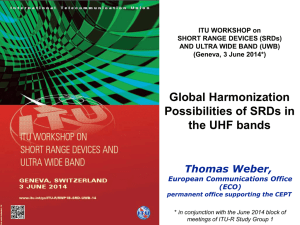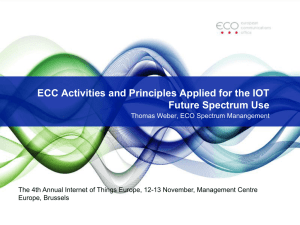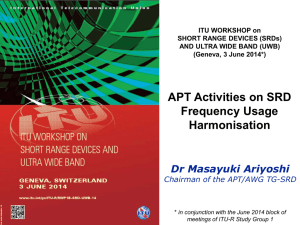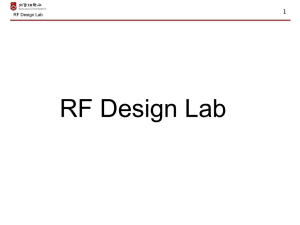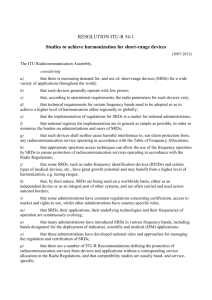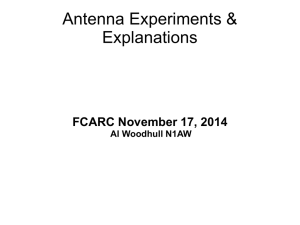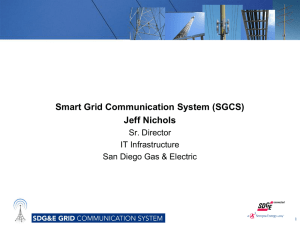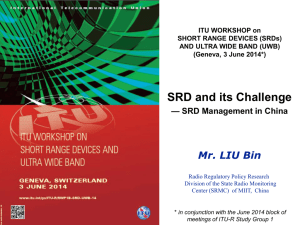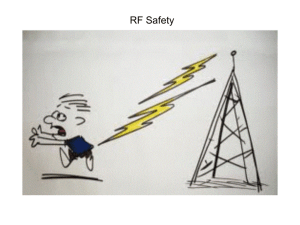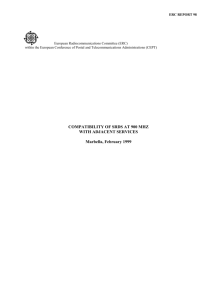ITU Development Forum
advertisement
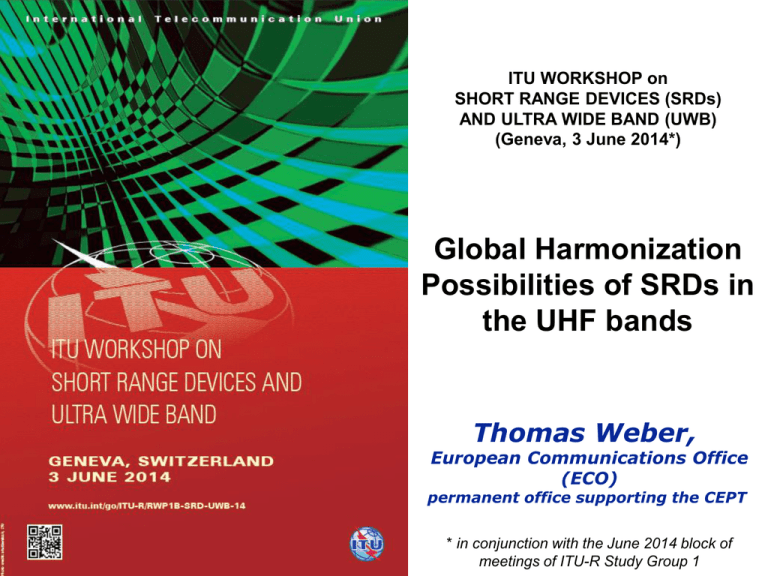
ITU WORKSHOP on SHORT RANGE DEVICES (SRDs) AND ULTRA WIDE BAND (UWB) (Geneva, 3 June 2014*) Global Harmonization Possibilities of SRDs in the UHF bands Thomas Weber, European Communications Office (ECO) permanent office supporting the CEPT International Telecommunication 2014 block of Union * in conjunction with the June meetings of ITU-R Study Group 1 Table of Contents • ERC Recommendation 70-03 • Existing frequencies for UHF SRDs in Europe in 863-870 MHz • New frequency opportunities in 870-876/915921 MHz • Proposals • Results of studies and regulatory approach • Related standardization activities • Proposal ITU Workshop on Short Range Devices (SRDs) and Ultra Wide Band (UWB), 3 June 2014, Geneva 2 ERC Recommendation 70-03 Relating to the use of Short Range Devices (SRD) in Europe ERC/REC 70-03 includes: spectrum management requirements and technical specifications for SRDs; links to all applicable reference documentation such as CEPT/ECC Reports, CEPT/ECC and EC Decisions, and harmonized European Standards; National implementation information; available in data format in www.efis.dk. ITU Workshop on Short Range Devices (SRDs) and Ultra Wide Band (UWB), 3 June 2014, Geneva 3 863-870 MHz in Europe Survey in ECC Report 182 All kinds of Metering: > 10 million Home automation > 10 million Alarms (incl. intrusion sensing) > 10 million Automotive > 5 million Industrial > 2 million Audio > 2 million RFID > 100 000 readers Social/personal alarms > 100 000 units Annual growth of equipment population (very conservative estimate, only based on survey feedback). ITU Workshop on Short Range Devices (SRDs) and Ultra Wide Band (UWB), 3 June 2014, Geneva 4 Survey: Some Technical Aspects (Low) Duty Cycle still dominates and for a large number of SRD applications! SRDs: What you often have to measure.. 60 Max Cumulated TxON time Max equivalent DC Application 50 with current definition (per 1 h) (data comes from surveys, not from measurements) over 1 second [in seconds] 40 30 Techniques 20 Automotive 100ms remote keyless entry 0.15 0.002% convertible roof 1 0.139% TPMS 0.03 0.001% ITS CAM 0.015 0.125% Home & building control 10ms Mains powered devices 0.025 0.003% 0.2 0.005% 0.6 0.007% 1 0.012% Repeaters 0.025 0.001% Smoke detectors 1 0.00139% Low cost point to point devices 1 0.012% Telemetry, telecomand 350ms to 1s 10 0 FHSS DSSS LBT + AFA LBT Duty Cycle Other Responses Battery powered devices 30 25 20 Bandwidth 1 15 10 5 0 kHz 1.620% Metering 25ms to 1s without in home display 0.025 0.000029% with in home display 0.025 0.003% Repeaters 0.025 0.001% EN13753 Mode R2 1 0.023% Alarms 25ms to 1s Intrusion alarm 0.025 0.001% Social alarm 0.15 0.001% Battery power devices 1 0.028% Imaging 1 0.007% Referee voice system 0.1 0.417% ITU Workshop on Short Range Devices (SRDs) and Ultra Wide Band (UWB), 3 June 2014, Geneva 5 Additional Spectrum CEPT has reached a major milestone in the development and management of frequencies in the favored range just below 1 GHz for a whole range of SRDs applications A pair of reports is setting out a roadmap for a major upgrade of 19 MHz of spectrum; Rising spectrum demands for generic SRD, UHF RFID, Home Automation & Sub Metering, automotive SRD, Smart Meters and Smart Grids, Metropolitan Mesh Machine Networks (M3N) applications, Alarm and Social Alarm systems, and Assistive Listening Devices (including hearing aids) reported from ETSI ITU Workshop on Short Range Devices (SRDs) and Ultra Wide Band (UWB), 3 June 2014, Geneva 6 ETSI Proposals to CEPT The European Telecommunication Standards Institute (ETSI) published five system reference documents: Generic SRD, RFID, Home Automation & Sub Metering and Automotive SRD in ETSI TR 102-649-2; Smart Meters and Smart Grids, ETSI TR 102 886 ; Metropolitan Mesh Machine Networks (M3N) applications, ETSI TR 103 055; Alarm and Social Alarm systems, ETSI TR 103 056; and Assistive Listening Devices, ETSI TR 102 791. Proposal to use under-utilized spectrum in many European countries; notably 870 - 876 MHz, and 915 - 921 MHz ITU Workshop on Short Range Devices (SRDs) and Ultra Wide Band (UWB), 3 June 2014, Geneva 7 Main motivations 1. In addition to capacity constraints the 2. 3. 4. 5. bandwidth of the existing plans restricts the development of applications; e.g. a wider bandwidth for individual RFID devices will improve their performance and the utility; With machine mesh networks the required bandwidth of the systems would not fit in the existing narrow bandwidths available; More proposals to come, e.g. in draft IEEE 802.11ah to use sub 1GHz frequencies; Building attenuations: extensive studies showed a great advantage of sub 1GHz frequencies. ITU Workshop on Short Range Devices (SRDs) and Ultra Wide Band (UWB), 3 June 2014, Geneva 8 Against this background 1. Region 2 has an allocation of nearby frequencies (902 to 928 MHz) to ISM, which is a convenient basis for using SRDs, and therefore a lot of equipment is being developed to operate in this range; 2. For Europe, as part of the ITU-R Region 1, no ISM band was identified at the World Radio conference in 1977 in this part of the spectrum; 3. Severe under-utilization in 870-876 MHz/915921 MHz in many European Countries. ITU Workshop on Short Range Devices (SRDs) and Ultra Wide Band (UWB), 3 June 2014, Geneva 9 Existing Primary Usage in Europe 25 Existing Usage in 870-876/915-921 MHz, also taking into account current planning (43 of countries) – from ECC Report 189 20 15 10 5 0 No usage- whole bands No usage - part of bands PMR/PAMR military/governmental ITU Workshop on Short Range Devices (SRDs) and Ultra Wide Band (UWB), 3 June 2014, Geneva Planned future E-GSM-R 10 Results ECC Report 200 gives the background and conclusions to a comprehensive set of coexistence studies in these under-utilized UHF bands in Europe. Some of these used the ECC’s SEAMCAT analysis tool, developed and maintained by the ECO in Copenhagen. The related ECC Report 189 used these conclusions to define recommended regulatory parameters for SRDs. Finally Recommendation 70-03 was agreed in February 2014 with new entries in the 870876/915-921 MHz frequency bands (‘soft harmonization approach’) ITU Workshop on Short Range Devices (SRDs) and Ultra Wide Band (UWB), 3 June 2014, Geneva 11 Conditions in 870-876/915-921 MHz The review included an audit of these existing and planned uses, which revealed not only some of the military tactical systems in use in this spectrum, but also some new uses such as remote control of unmanned aircraft (UAV). Some other countries anticipate needing to use the spectrum in some specific locations for an extension of the existing GSM-R bands. The studies in the ECC have covered this utilization to provide a solution for spectrum sharing with GSM-R. ITU Workshop on Short Range Devices (SRDs) and Ultra Wide Band (UWB), 3 June 2014, Geneva 12 870-876 MHz 500 mW (with APC), ≤200 kHz Up to 2.5% DC Metropolitan/Rural Area Networks. Up to 10% DC for Network Relay Points (subject to individual license)(ERC Rec 70-03 Annex 2) 500 mW (with APC), ≤500 kHz, 0.1 % DC TTT Vehicle to Vehicle only (ERC Rec 70-03 Annex 5) 100 mW (with APC) 0.1% DC TTT in vehicle only (ERC Rec 70-03 Annex 5) 25mW 1% DC ≤600 kHz (ERC Rec 70-03 Annex 1) 25mW 0.1% DC ≤200 kHz (ERC Rec 70-03 Annex 1) RD ER- 870 MHz R- 7 - 76 Hz 875.6 MHz ITU Workshop on Short Range Devices (SRDs) and Ultra Wide Band (UWB), 3 June 2014, Geneva 875.8 MHz 876 MHZ 13 915-921 MHz CF 916.3 MHz 200 kHz of low DC safe haven RFID tag return RFID @ 4W SRD 100 mW 1% DC ALD 10 mW. 25% DC Per chan nel CF 917.5 MHz CF 918.7 MHz CF 919.9 MHz RFID @ 4W SRD 100 mW 1% DC ALD 10 mW. 25% DC Per chan nel RFID @ 4W SRD 100 mW 1% DC ALD 10 mW. 25% DC Per chan nel RFID @ 4W SRD 100 mW 1% DC ALD 10 mW. 25% DC Per chan nel RFID tag return RFID tag return RFID tag return RFID tag return 200 kHz Low DC safe haven 25 mW 1% DC Per 600 kHz channel. Channel bandwidth ≤ 600 kHz 25 mW 0.1% DC Per 200 kHz channel. Channel bandwidth ≤ 200 kHz ER- mobile 915MHz 915.3 MHz 916.1 MHz 916.5 MHz 917.3 MHz 917.7 MHz 918.5 MHz 918.9 MHz (ba e tation 1 - 21 Hz 919.7 MHz ITU Workshop on Short Range Devices (SRDs) and Ultra Wide Band (UWB), 3 June 2014, Geneva 920.1 MHz R- 920.9 MHz 921 MHZ 14 Related Standardization As a result of the decision by CEPT to make additional spectrum available, ETSI will introduce revisions to the standards EN 300 220 for SRDs and EN 302 208 for UHF RFIDs. It is hoped that the new versions of the standards will become available during 2015 Additional new harmonized European standards are under development in ETSI, e.g. EN 303 204 for Network Based SRDs which are SRDs intended to operate in association with other SRDs to form topologies for metropolitan/rural area networks ITU Workshop on Short Range Devices (SRDs) and Ultra Wide Band (UWB), 3 June 2014, Geneva 15 Proposal Resolution ITU-R 54-1 invites the ITU-R membership to consider study results with a view to take necessary action in relation with the administrations’ national regulations for SRDs, as appropriate. Potential candidate for amended inclusion in Recommendation ITU-R SM.1896 ITU Workshop on Short Range Devices (SRDs) and Ultra Wide Band (UWB), 3 June 2014, Geneva 16 Thank you for you attention Questions?? Thomas.Weber@eco.cept.org www.cept.org/eco www.cept.org/ecc ITU Workshop on Short Range Devices (SRDs) and Ultra Wide Band (UWB), 3 June 2014, Geneva 17
